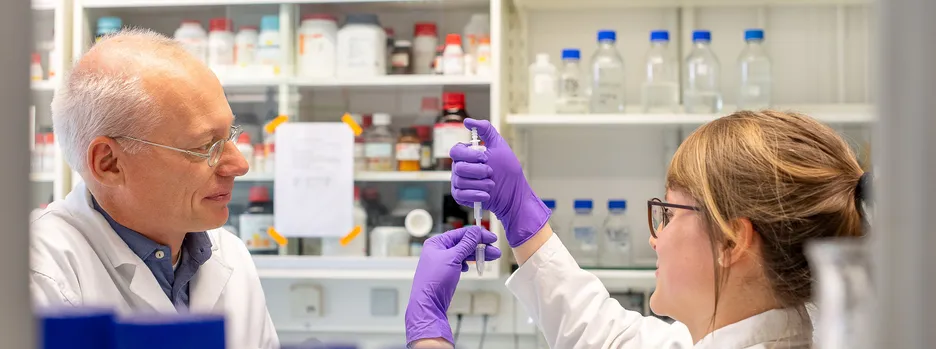
Requirements for doctoral admission
Regardless of the type of doctorate you choose, you must fulfill a number of formal requirements set out in the TUM doctoral regulations. In addition to the formal requirements for your university degree, finding a supervisor for your dissertation is the most important step in your application.
University degree
The prerequisite for a doctorate at TUM is an above-average degree (master's, Diplom or Magister) from a university, an equivalent state examination, or a master's examination at a German university of applied sciences. Applicants with a foreign university degree who wish to do a doctorate at TUM (and in Germany) must prove that their degree directly entitles them to do a doctorate in the country where they obtained the master’s degree and is comparable to a German academic university degree (diploma, magister, state examination or master's degree).
The above-average performance exists if the degree program was completed with an overall grade of at least 2.5 or at least with the grade "good pass." Applicants with a foreign university degree can calculate their final grade themselves using the Bavarian Formula. This calculation is only for your initial orientation and is not binding!
The responsible TUM School always decides on the recognition of your degree.
Please note that TUM does not offer “fast-track doctoral programs.” Therefore, admission to a doctoral program with only a Bachelor's degree is not possible.
At TUM, a decision on the possible recognition of your (foreign) university degree for doctoral admission will only be made after you have already found a professor at TUM to supervise your dissertation. A preliminary examination to determine whether your Master's degree can be recognized as equivalent is not possible.
Language requirements
There are no formal language requirements for doctoral admission and research at TUM. However, a doctorate at TUM requires very good written and spoken English skills. Although there are usually no prescribed minimum scores in the relevant tests (IELTS, TOEFL, etc.), in order to be successful in your doctorate, you should be able to understand, write and communicate fluently in English with your supervisor, colleagues, TUM staff and the general scientific audience.
Knowledge of German is not required but a great advantage to manage your everyday life in Germany.
Finding a doctoral supervisor
Every doctoral candidate at TUM has a supervisor (so-called “Doktormutter or Doktorvater” in German). The search for a supervisor who will supervise your doctorate is, therefore, a crucial part of the application for a doctorate at TUM. The search for a doctoral supervisor is also the first step in applying for a doctorate at TUM. If you have not found a supervisor for your research project, you will unfortunately not be able to do your doctorate at TUM.
Ideally, you should start your search for a supervisor with contacts at TUM whom you may have already met during your Master's studies, at a conference, a symposium, or in another academic context. It is also a good start to find out whether professors at your home university have collaborations with TUM professors. If you do not have any contacts with TUM professors, you can start your search on the website of the respective TUM School in your research area. Here you will find an overview of all chairs, research groups, and professors, as well as their main research areas, current research projects, and publications. Look for professors with a research focus that matches your education, professional experience, and research interests! A good starting point is to check the publication list and conference papers/presentations of the research group/chair in question to see if their current research activities match your research interests.
Our TUM Schools are highly interdisciplinary, and many topics (e.g. robotics) are addressed by several schools from different angles and research perspectives. Therefore, please also take a look at the ongoing research in other TUM Schools.
Please remember that the choice of your supervisor should be based on professional requirements and personal compatibility. Your supervisor will not only be your formal examiner at the end of the doctorate but also a close personal mentor, work colleague, and/or supervisor for the next 3-5 years. You should, therefore, try to get to know potential supervisors personally if possible (e.g., at conferences, at summer/winter schools) and/or find out as much as possible about the personality and working/supervision style of your potential supervisor in advance, e.g., by contacting doctoral candidates at the relevant chair.
Once you have found one or more potential supervisors, please contact the professor(s) directly with your application, which consists of your CV, your Master's certificate, your letter of motivation, summaries of your previous publications/conference papers (if applicable) and a research proposal for your dissertation project.
There are no application deadlines for doctoral applications. You can contact potential supervisors at any time. As a rule, initial contact is made by e-mail.
Tips for making contact
- Avoid impersonal e-mails. Instead, show that you are well-informed about the research topics and research interests of the potential supervisor.
- Tell potential supervisors briefly and precisely who you are and why you would like to do your doctorate with the professor in question. Get to the point and start your e-mail directly with your request.
- Choose a clear and meaningful subject line (e.g. "Request for doctoral supervision: Protein X-ray structure analysis") and avoid general subject lines like “Loong for PhD position.”
- Make sure that your e-mail and other application documents do not contain any grammatical or spelling mistakes! Address the professor correctly and avoid informal formulations such as "Dear Sir or Madam."
- Never write to several professors in one e-mail!
- If you have already secured funding (e.g. a scholarship) for your doctorate, make a note of this in your communication.